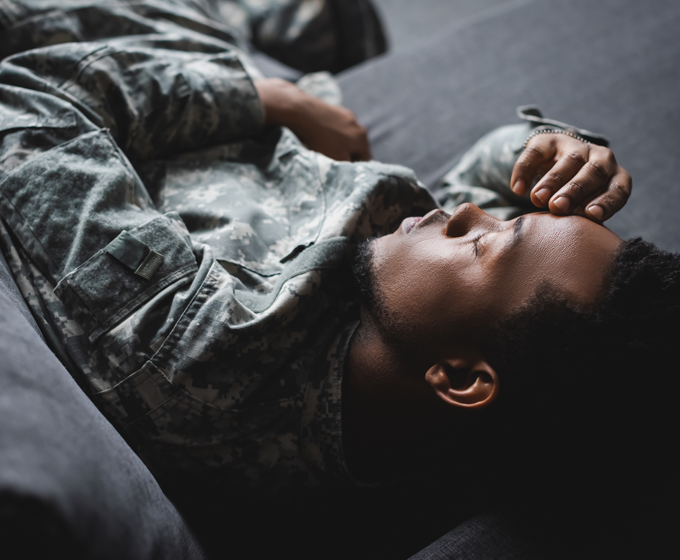
MAY 6, 2020 — Although social distancing and self-isolation measures have slowed the spread of COVID-19 in the United States, psychologists and advocates worry about the impact these orders have had on the most vulnerable members of society. One of those populations is those suffering from post-traumatic stress disorder and other mental and physical health conditions, including military veterans.
Although most military veterans do not have PTSD, a significant percentage will, and health care professionals are worried that social isolation might not only worsen PTSD symptoms but also increase the risk for suicide.
To address this concern, Sandra Morissette, a clinical psychologist, professor and interim chair of the Department of Psychology at UTSA, was recently funded by the Veterans Administration to study the impact of changing social networks during COVID-19 on mental health and suicide in veterans. This research will help Morissette and her team do a deeper dive into understanding the impact of social networks on suicide, which could in turn inform how suicide prevention is approached.
According to a 2019 VA report, the suicide rate among veterans was 1.5 times the national average—even before the pandemic swept the country. “Seventeen veterans die each day from suicide. Because of the strong protective link between social support and suicide, there is deep concern from psychologists and other mental health providers about the impact of loneliness and isolation related to this pandemic on suicide rates,” Morissette said. “That’s true for both veterans and civilians.”
Most veterans, Morissette said, are generally very resilient people who are often well-trained to handle stressful situations and crises. However, some feel marginalized in their professional, educational or family lives after they return from combat, and they struggle to reintegrate into civilian norms. Isolation only exacerbates the loneliness, a feeling that’s directly tied to the highest levels of depression and suicidal thoughts in former service members.
The broader focus of Morissette’s research is to identify modifiable risk and resilience factors that contribute to functional recovery and impairment following war zone deployments. She aims to provide a platform for the development of novel interventions that will help veterans who are struggling with recovery and reintegration. For more than a decade she has worked with a group of national collaborators to conduct a series of longitudinal trials to better understand how veterans function after deployment and war zone experiences.
In one of these papers Morissette and her collaborators demonstrated that, even when veterans had high PTSD symptoms, they had less suicidal ideation when surrounded by high perceived social support. When these veterans had low perceived social support, however, they experienced the greatest levels of suicidal ideation.
“Since then, we’ve been very interested in understanding the relationship between social support and other social processes, like belongingness, on suicidal thoughts and behavior,” Morissette explained.
Actively seeking that social support can be a challenge during the current pandemic. Because they are trained to be self-sufficient and serve others, veterans tend not to ask for help, Morissette elaborated. Such help could take many forms, including leaning on a friend for a listening ear, asking a neighbor to pick up something from the grocery store or simply recognizing the need for professional help.
“Knowing when to ask for—and receive—help can be critical for well-being and create a sense of belonging and connectedness in the midst of isolation,” Morissette said.
The UTSA Office for Veteran and Military Affairs has worked tirelessly to cultivate a supportive community for student veterans and military-affiliated students at the university. VMA has continued to maintain that level of engagement through the COVID-19 pandemic and is currently in the process of recreating its Coffee with Vets event for the virtual environment on May 22.
Lisa Carrington Firmin, associate vice president for veteran and military affairs at UTSA, noted both the importance of Morissette’s research and her office’s role in social support for UTSA’s military-affiliated population.
“Engaging and networking with others who have shared common experiences are vital to maintaining positive environments where veterans can thrive,” Firmin said. “These type of informal yet impactful events can be lifelines to some and bring key individuals together to provide much needed information and services to others.”
UTSA Today is produced by University Communications and Marketing, the official news source of The University of Texas at San Antonio. Send your feedback to news@utsa.edu. Keep up-to-date on UTSA news by visiting UTSA Today. Connect with UTSA online at Facebook, Twitter, Youtube and Instagram.
Move In To COLFA is strongly recommended for new students in COLFA. It gives you the chance to learn about the Student Success Center, campus resources and meet new friends!
Academic Classroom: Lecture Hall (MH 2.01.10,) McKinney Humanities BldgWe invite you to join us for Birds Up! Downtown, an exciting welcome back event designed to connect students with the different departments at the Downtown Campus. Students will have the opportunity to learn about some of the departments on campus, gain access to different resources, and collect some giveaways!
Bill Miller PlazaCome and celebrate this year's homecoming at the Downtown Campus with food, games, giveaways, music, and more. We look forward to seeing your Roadrunner Spirit!
Bill Miller PlazaThe University of Texas at San Antonio is dedicated to the advancement of knowledge through research and discovery, teaching and learning, community engagement and public service. As an institution of access and excellence, UTSA embraces multicultural traditions and serves as a center for intellectual and creative resources as well as a catalyst for socioeconomic development and the commercialization of intellectual property - for Texas, the nation and the world.
To be a premier public research university, providing access to educational excellence and preparing citizen leaders for the global environment.
We encourage an environment of dialogue and discovery, where integrity, excellence, respect, collaboration and innovation are fostered.